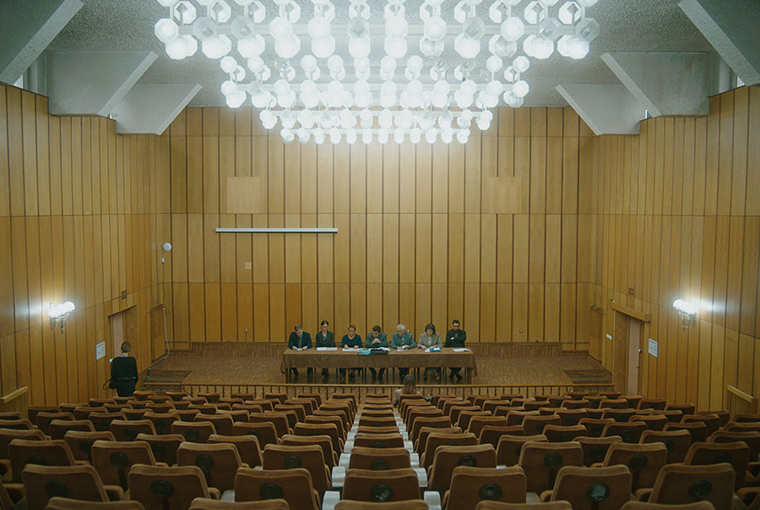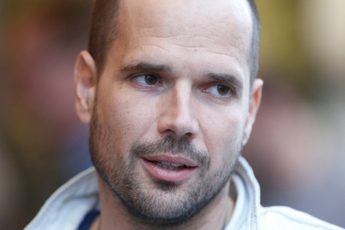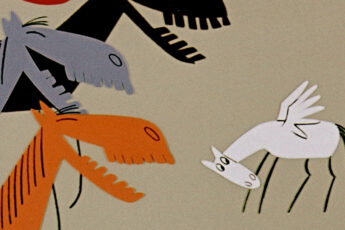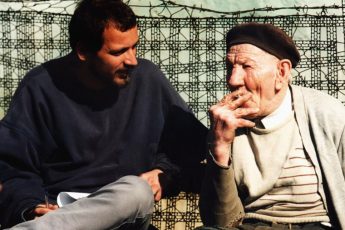A Dead Bear of Hungarian Society
Katalin Moldovai’s Without Air (Elfogy a levegő, 2023)
Vol. 141 (January 2024) by Margarita Kirilkina
The screen is dark. A female voice hypnotically invites us to imagine the letter “O”, to approach it, to give it a shape, thus nudging us to immerse ourselves in the world of imagination. The action of Katalin Moldovai’s film Without Air begins in a school classroom: the quiet and calm voice of the teacher, the fact that the students are paying attention, and the gentle lighting all indicate that this is a conflict-free space. But after the lesson ends and the children leave the class room, in the corridor they meet a scary taxidermized bear who has been brought to the school for decoration, a first sign of the unsettling events about to unfold.
During literature lesson, the teacher suggests that the students watch Agnieszka Holland’s erotically charged Total Eclipse about the relationship between the poets Arthur Rimbaud and Paul Verlaine. Viktor’s dad writes a complaint, claiming that the teacher is “destroying moral values” by teaching children “things she isn’t paid for”. Nevertheless, Viktor (Soma Sándor) – a shy and gentle boy, – chooses Ana’s facultative poetry class over the football club preferred by his father. There he reads his own poems, thus resisting the authoritative and conservative ideas of his father. Thus, the film depicts a confrontation between two generations: the older one committed to stable but outdated values and the younger one striving to break free from the rigidity of Hungarian everyday life. Poetry here plays the role of a language liberated from the burden of conservatism, free from the dry linguistic rules taught in school. When the teacher attends a parent meeting, the bear reappears in the background, out of focus.
Without Air relates a Kafkaesque story about the control of bureaucracy over all aspects of life, including those relevant to the youth. Bureaucratic speech is spoken through soulless reports, while the youth’s language is poetry. Visually, power becomes manifest in the administrative building where Ana (Ágnes Krasznahorkai) and the school’s headmistress Eva (Tunde Skovran) face the committee that will decide on Ana’s punishment. Here an endless, absurd process begins that appears to defy logic. The building’s interior is dominated by cold marble and empty corridors, creating a suffocating sense of the inaccessibility of power, with no place for poetry, and no space to breathe.
The place of poetry in the school timetable, which is the only part of the day characterized by horizontal relationships, is in the afternoon, after the obligatory lessons. The rest of the day is dominated by hierarchical relations: headmistress – teacher, husband – wife, father – son, mother – daughter. In her capacity as the school’s authority, the headmistress acts only to please the authorities who are even higher up. Her interests are driven by the need to maintain the prestigious image of the school and secure funding for a new sports hall.
The complete isolation of the teacher occurs after the entire school turns against her, her mother is hospitalized, and her husband informs her that he will leave Hungary to work as a doctor abroad. Another issue of contemporary Hungarian society is touched on briefly here – the migration of qualified workers, with those who remain being forced to comply with established rules. Ana finds herself in a state of complete isolation and ultimately loses out in the struggle against the bureaucracy. However, the film does not end there, and in the most dramatic moment of the film, when Ana must leave the school, her poetry class students finally transition to being the active group by staging their own small rebellion against the school system and the conservatism of their parents.
If we take a closer look at the bear, it can confidently be stated that it is dead. Its threatening appearance is nothing more than an illusion. Without Air was inspired by a real story that occurred in a school in Hungary, which was translated first into a theater play and then into a film script. The attention paid to the story by the Hungarian public shows a willingness to overcome the invisible force that keeps society in a state of fear.




Leave a Comment